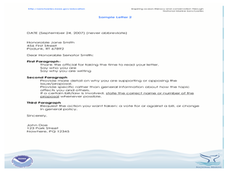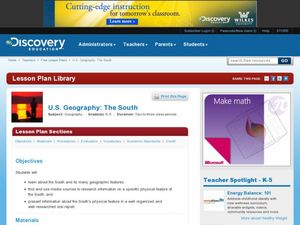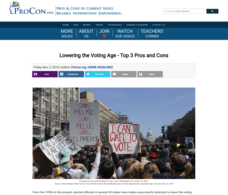Curated OER
What Is the Nature of Science?
Students distinguish between scientific and everyday meanings of key words-theory, hypothesis, law, fact-and use in context. They recognize the variables that affect observation, data collection, and interpretation. They discover the...
University of North Carolina
Argument
What elements make up a successful argument? A helpful resource describes aspects of an argument such as the claim, evidence, counterargument, and audience. Perfect as an individual assignment for a flipped lesson or collaborative work,...
EngageNY
Forming a Research-Based Claim: Creating Stakeholders Charts
Present the facts. Scholars create presentations of their research on DDT using their Cascading Consequences chart and a
Stakeholders Impacts chart as visuals. They discuss the term stakeholders and create a Stakeholders Impacts chart...
EngageNY
Using Multiple Resources of Information: Creating a Cascading Consequences Chart about DDT and Practicing a Fishbowl Discussion
For every action there is a consequence. Scholars continue their work on creating a cascading consequence chart about DDT using Welcome Back, The Exterminator, Rachel Carson: Sounding the Alarm on Pollution along with graphic organizers...
PBS
Predicting/Making a Hypothesis
As an introduction to the hypothesis and testing method of investigation, young history detectives engage in a special investigation of a family artifact. After watching a short video that demonstrates the method, they develop a...
Curated OER
Arab Spring: Unrest in the Middle East, 2011-2012
The conflict in the Middle East is a hot topic that can be somewhat confusing. In order to better grasp the who, what, where, when, and why of this world affair, learners fill out a chart. They record basic facts about each country...
Curated OER
What Makes Our Community Special?
Explore websites, complete research, and use technological tools to create a final multimedia presentation on what makes a community special. Learners of all ages work with a partner to research an interesting aspect of their community,...
Curated OER
In My Opinion
Young writers craft letters to the government stating their opinion on different topics. They pick an environmental or ocean issue, research it, and craft their formal persuasive letter. Ensure your learners include supporting facts and...
Curated OER
U.S. Geography: The South
Young geographers complete a research project. They list the physical features found in the American South. They then discuss the economy, culture, and geography found in the South. They work in groups to research one of the five...
Curated OER
(Clues to) Copying the Codes: Examining the Evidence
Students view animations of DNA replication and transcription and complete a worksheet. In this genetics lesson, after watching on-line video clips to gather information about DNA replication and transcription, student teams identify...
Curated OER
Identifying When Using Evidence from the Text
First listen to the story The Meanest Thing to Say and then answer question regarding when the story takes place. Using evidence from the text, text clues and pictures to order events and find the time frame of the story is what this...
iCivics
We the Jury
Learners take on the roles of jurors in a civil case to evaluate evidence and determine a verdict in this engaging online interactive experience.
Curated OER
Let's Get it Together! Reading to Learn
Let’s learn about frogs! Young readers are led through “Freaky Frogs,” a non-fiction article. Teach learners how to edit an article so there are fewer details to sift through. After talking through the article, they learn the six steps...
Tutor 2 U
Plan for the Murder Solving Lesson
It's a classic case of whodunnit - with a forensic twist! Learners observe a crime scene and compile evidence, along with emergency phone calls, fingerprints, and interview statements to find the criminal and solve the crime.
Curated OER
Learning the Roles in Literature Circles
I love literature circles! Get your pupils together and have them discuss the book they are reading. They determine and practice their role in the literature circle then discuss the book they are reading. This is a great introduction to...
Austin Independent School District
Visual Discovery Note Taking Sheets
Step into history and step out with a new understanding of events. These strategies bring a new level of understanding of key events by asking viewers to engage in and respond to projected images. Complete directions for the activity, a...
ProCon
Voting Age
Should age matter when it comes to voting? Scholars read an article discussing the pros and cons of lowering the voting age to 16. They then consider both the advantages and disadvantages of having younger voters. After thinking about...
Education Bureau of Hong Kong
Fundamentals of Critical Thinking
Analyzing arguments is key to critical thinking. Colorful slides teach viewers how to recognize the structure of an argument, the claims, and the validity of the evidence used to support an argument. Then, provided scenarios permit...
Newseum
Weighing the Arguments
To understand how personal perspectives can affect policy and politics, scholars examine the woman suffrage media map and historical artifacts to analyze arguments for and against women's suffrage. Class members then take on the role of...
Roald Dahl
James and the Giant Peach Lesson Plans
Immerse yourself in the world of giant bugs, rolling peaches, and brave little boys with an interdisciplinary unit on James and the Giant Peach. Young readers focus on the scientific themes of Roald Dahl's classic novel with bug hunts,...
EngageNY
Using Multimedia in Presentations: Preparing to Present Claims
Time to wrap it all up! Using facts, details, and examples, pupils present their claims about whether the American Academy of Pediatrics should increase its screen time recommendations. They incorporate a multimedia visual display and...
Newseum
Persuasion Portfolios
After class members brainstorm a list of current social and political issues, groups each select a different topic from the list to research. Teams create a portfolio of at least 10 examples of stories about their issue, stories that...
Newseum
Bias Through History: Analyzing Historical Sources
Young journalists use the E.S.C.A.P.E. (evidence, source, context, audience, purpose, and execution) strategy to evaluate historical and contemporary examples of bias in the news. The class then uses the provided discussion questions to...
Curated OER
Many Passages: The Voyage of the Slave Ship Brookes
Examine three perspectives of the slave trade - captain, sailor, and captive - through this collaborative analysis activity. Small groups study one perspective with a primary source to analyze. They discern what is a historical fact and...

























